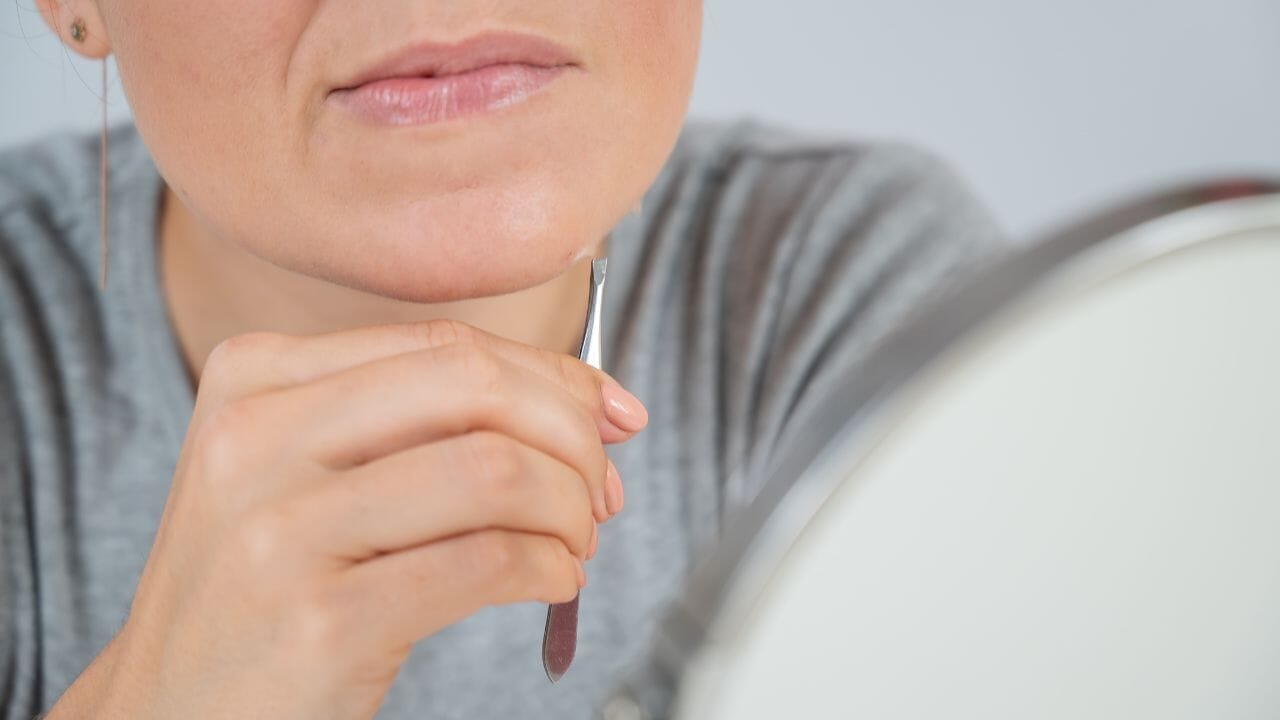
Why do random chin hairs appear after 40? The surprising truth
You’re casually checking the mirror when, bam! a rogue chin hair appears out of nowhere. If you’ve noticed random chin hairs popping up after 40, you’re not alone. Many women experience these pesky strays, often wondering, Where did that come from? And why does it feel like steel wire?!
This article explores the hormonal causes behind post-40 facial hair, why it happens during perimenopause and menopause, and - most importantly - how to manage it safely and effectively.
Why do chin hairs appear after 40?
The culprit? Hormonal changes. As women enter perimenopause (late 30s to early 40s) and menopause (typically 45+), their oestrogen levels decline, while testosterone remains stable or even increases proportionally. This shift can lead to:
✔ Thicker, darker facial hairs (hirsutism)
✔ A decrease in collagen and skin elasticity(making hair more noticeable)
✔ Faster-growing coarse hairs on the chin, jawline, and upper lip
According to the NHS, menopause-related hormonal shifts can affect everything from hair growth to metabolism, leading to noticeable changes in facial hair.
The role of hormones: oestrogen vs. testosterone
Before 40: Oestrogen keeps testosterone in check, preventing excess hair growth.
After 40: With less oestrogen, testosterone has a greater influence, leading to the emergence of random facial hairs This is why some women never had facial hair in their 20s but suddenly find themselves tweezing chin hairs at 45.
Other factors that contribute to chin hair growth
Besides hormonal changes, other factors can cause those stubborn chin hairs to sprout:
- Genetics – If your mum or grandmother had chin hairs, you might, too.
- Polycystic Ovary Syndrome (PCOS) – A common condition causing excess androgens.
- Stress & Cortisol – High stress levels can impact hormone balance and increase hair growth.
- Medications – Some drugs (e.g., steroids, hormone therapies) may trigger facial hair. The British Menopause Society notes that changes in hormone levels during menopause may contribute to increased facial hair growth in women.
How to get rid of chin hairs (safely & effectively)
If the occasional rogue hair doesn’t bother you, that’s perfectly fine! But if you prefer smoother skin, here are some safe removal options:
Quick Fixes:
- Tweezing – Best for a few stray hairs; results last 2-4 weeks.
- Dermaplaning – Removes fine peach fuzz + exfoliates skin.
Longer-Term Solutions:
- Waxing or Threading – Lasts 4-6 weeks but may cause irritation.
- Laser Hair Removal – Reduces growth over time (best for darker hairs).
- Electrolysis – Permanent hair removal by destroying hair follicles.
Can probiotics help reduce chin hair growth?
Emerging research suggests that probiotics may play a role in balancing hormones during menopause, which could indirectly help reduce unwanted facial hair
Menopause disrupts the gut microbiome, affecting hormone metabolism—particularly oestrogen and androgens (like testosterone). Certain probiotic strains, such as Lactobacillus and Bifidobacterium, have been studied for their ability to:
- Support hormonal balance– Helping regulate oestrogen metabolism, which may prevent excessive androgens from triggering facial hair growth.
- Improve insulin sensitivity – Studies show that hormonal imbalances and insulin resistance are linked to excess hair growth (hirsutism) in some women. Probiotics may help stabilise blood sugar, reducing excess androgens
- Reduce inflammation – A healthy gut can help reduce inflammation-related stress on hair follicles, which may contribute to hair thinning or excess growth.
How can probiotics help?
If you’re looking for natural ways to support hormonal balance, a high-quality menopause-specific probiotic supplement may be beneficial.
-
Look for clinically studied probiotic strains like those in the Better Gut probiotic.
-
Support with a balanced diet rich in fibre, fermented foods, and hormone-friendly nutrients.
While probiotics won’t remove chin hairs overnight, they can support your body’s natural hormone regulation, making them a complementary option alongside other treatments.
Want to learn more? Explore our probiotic formula for menopause here.
When to See a Doctor
If chin hair growth is sudden, excessive, or accompanied by other symptoms (like irregular periods, weight gain, or acne), it may signal an underlying condition like PCOS or adrenal issues. A doctor can check hormone levels and recommend treatments.
Final Thoughts
Random chin hairs after 40 are a natural part of ageing and hormonal shifts, but they don’t have to be a nuisance. Understanding why they appear and knowing how to manage them can make the process a little less annoying.
References:
1. NHS – Menopause and Hormone Changes. (Accessed: March 2024) https://www.nhs.uk/conditions/menopause/
2. British Menopause Society – Hirsutism in Menopause. (Accessed: March 2024) https://thebms.org.uk/
3. Probiotics and Hormonal Balance in Menopause: A Review. (2021) [https://pubmed.ncbi.nlm.nih.gov/34109594

Joanna Lyall
Nutritional therapist
-
Regular priceFrom £59.00Regular priceSale priceFrom £59.00 Save £-59.00 (%)Unit price/ per
Better Gut
in your cart




